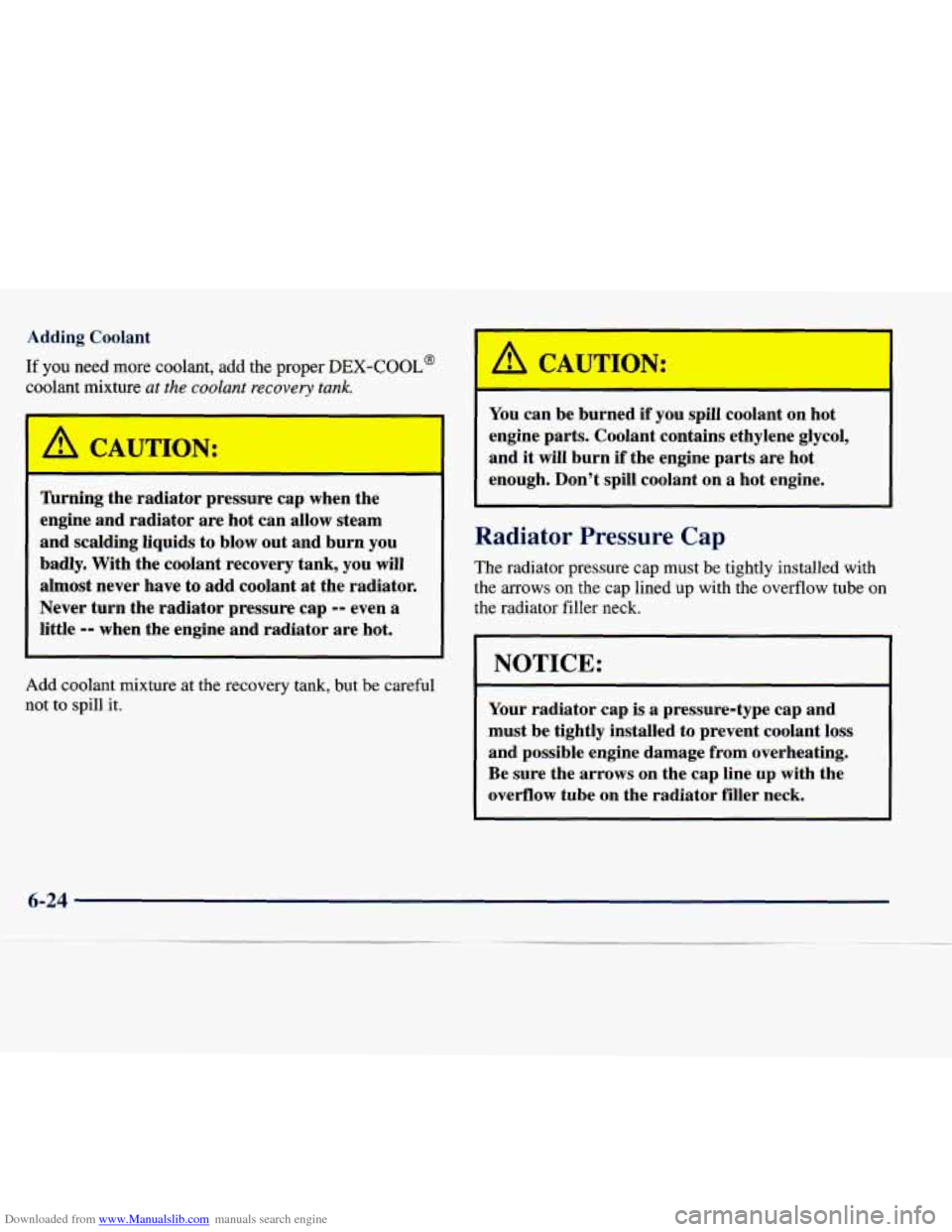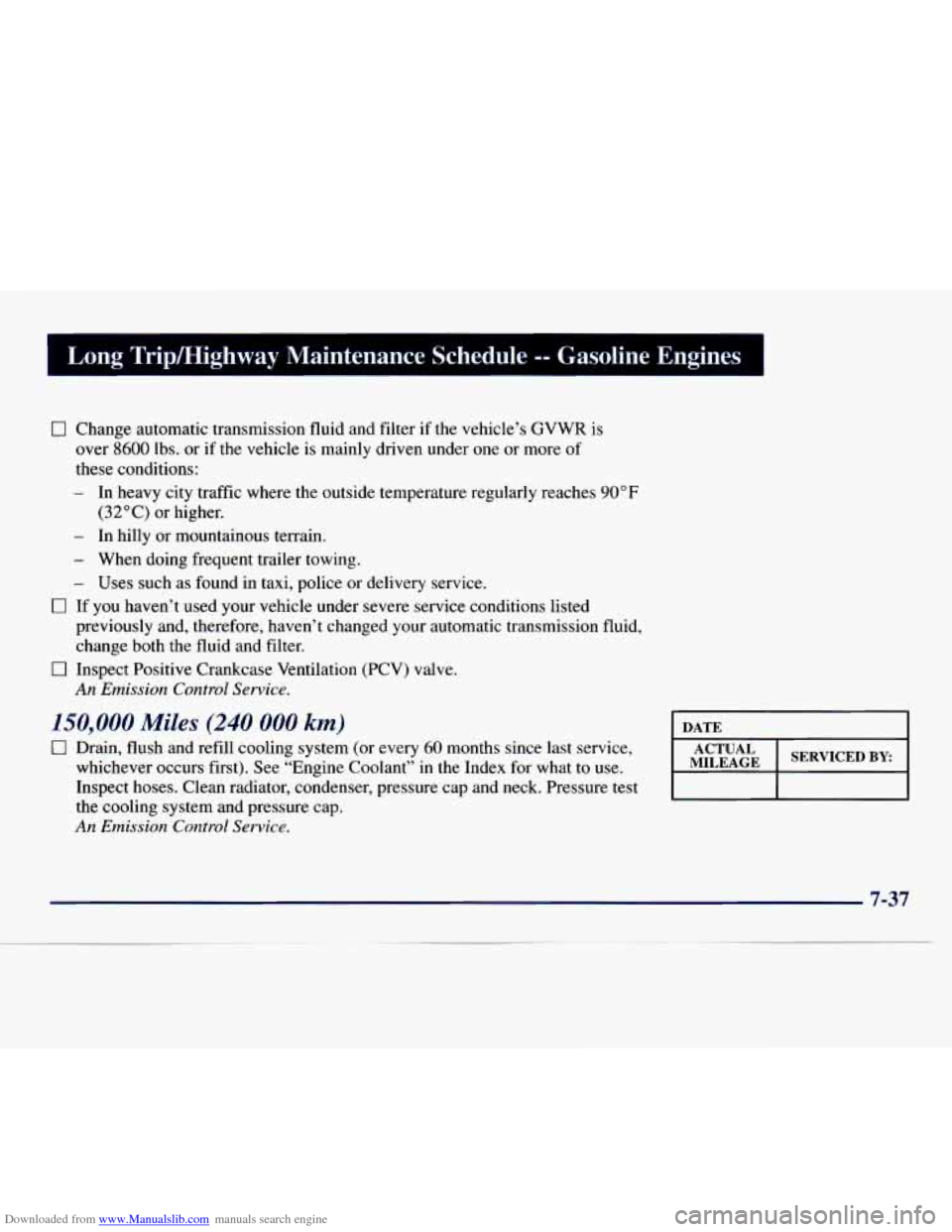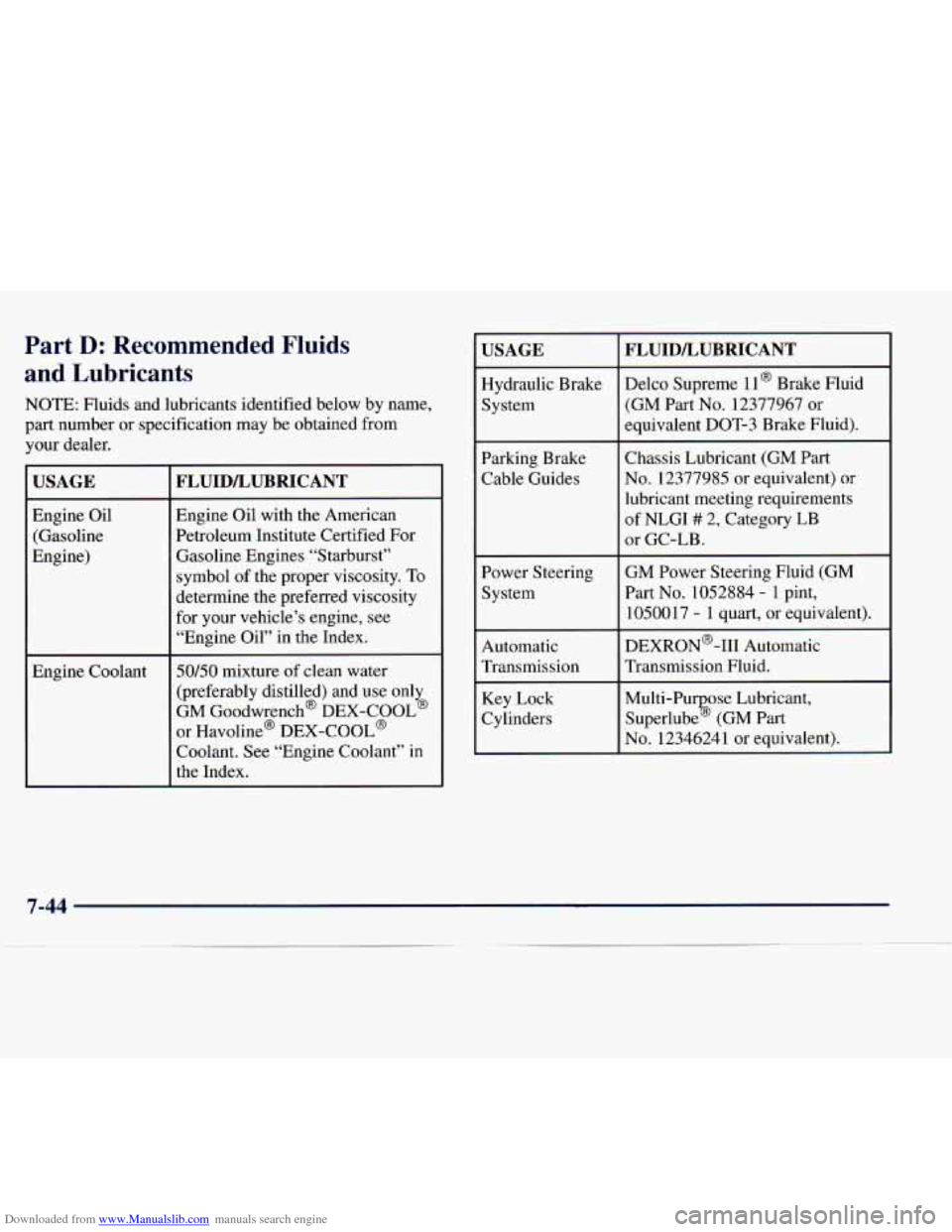Page 263 of 386

Downloaded from www.Manualslib.com manuals search engine Adding Coolant
If you need more coolant, add the proper DEX-COOL'
coolant mixture at the coolant recovery tank.
I
Wrning the radiator pressure cap when the
engine and radiator are hot can allow steam
and scalding liquids to blow out and burn you
badly. With the coolant recovery tank, you will
almost never have
to add coolant at the radiator.
Never turn the radiator pressure cap
-- even a
little
-- when the engine and radiator are hot.
Add coolant mixture at the recovery tank, but be careful
not to spill it.
A CAUTION:
You can be burned if you spill coolant on hot
engine parts. Coolant contains ethylene glycol,
and it will burn
if the engine parts are hot
enough. Don't spill coolant on
a hot engine.
Radiator Pressure Cap
The radiator pressure cap must be tightly installed with
the arrows
on the cap lined up with the overflow tube on
the radiator filler neck.
NOTICE:
Your radiator cap is a pressure-type cap and
must be tightly installed to prevent coolant loss
and possible engine damage from overheating.
Be sure the arrows on the cap line up with the
overflow tube on the radiator filler neck.
6-24
Page 264 of 386

Downloaded from www.Manualslib.com manuals search engine Thermostat
Engine coolant temperature is controlled by a thermostat
in the engine cooling system. The thermostat stops the
flow
of coolant through the radiator until the coolant
reaches
a preset temperature.
When you replace your thermostat, an
AC@ thermostat
is recommended.
Power :ring !
When to Check Power Steering Fluid
It is not necessary to regularly check power steering
fluid unless you suspect there is a leak in the system or
you hear an unusual noise. A fluid loss in this system
could indicate a problem. Have the system inspected
and repaired.
How To Check Power Steering Fluid
When the engine compartment is cool, wipe the cap
and the top of the reservoir clean, then unscrew the
cap and wipe the dipstick with
a clean rag. Replace
the cap and completely tighten it.
Then remove the
cap again and look at the fluid level on the dipstick.
The level should be at the
FULL COLD mark. If
necessary, add only enough fluid to bring the level up
to the mark.
To prevent contamination of brake fluid, never check or
fill the power steering reservoir with the brake master
cylinder cover
off.
6-25
Page 266 of 386
Downloaded from www.Manualslib.com manuals search engine When using concentrated washer fluid,
follow the manufacturer’s instructions for
adding water.
Don’t
mix water with ready-to-use washer
fluid. Water can cause the solution to freeze
and damage your washer fluid tank and
other parts of the washer system. Also,
water doesn’t clean as well as washer fluid.
Fill your washer fluid tank
only
three-quarters full when it’s very cold.
This allows for expansion if freezing occurs,
which could damage the tank if it is
completely full.
Don’t use engine coolant (antifreeze) in
your windshield washer.
It can damage
your washer system and paint.
Brakes
Brake Fluid
Your brake master cylinder reservoir is here. It is filled
with
DOT-3 brake fluid.
6-27
Page 302 of 386
Downloaded from www.Manualslib.com manuals search engine POSITION NAME
1. STOP
2. HTD hfIR
3. CTSY
4. GAUGES
5.
6.
7.
8.
9.
10.
11.
12.
13.
14.
HAZARD
CRUISE
PWR AUX CRANK
PARK LPS
AIR BAGS
WIPER HTR-A/C
CIG LTR
ILLUM
CIRCUITS PROTECTED
StopKHMSL, Stoplamps
Electric Heated Mirrors
Courtesy Lamps, Dome/RDG Lamps, Vanity Mirrors, Power Mirrors
IP Cluster, DRL Relay, DRL Module, HDLP Switch, Keyless Entry
Illumination, Low Coolant Module, CHIME Module, DRAB Module
Hazard Lamps/CHIME Module
Cruise Control Auxiliary Power Outlet, DLC
License Plate Lamp, Parking Lamps, Taillamps, Front Sidemarkers, Glove
Box Ashtray
Air
Bags
Wiper Motor, Washer Pump
A/C, A/C Blower, High Blower Relay, HTD Mirror
Cigarette Lighter IP Cluster, HVAC Controls, RR HVAC Controls, IP Switches, Radio
Illumination, Door Switch Illumination
Page 337 of 386
Downloaded from www.Manualslib.com manuals search engine I Short TripKity Maintenance Schedule -- Gasoline Engines 1
100,000 Miles (166 000 km) (Continued)
- In hilly or mountainous terrain.
- When doing frequent trailer towing.
- Uses such as found in taxi, police or delivery service.
0 If you haven’t used your vehicle under severe service conditions listed
previously and, therefore, haven’t changed your automatic transmission fluid,
change both the fluid and filter.
An Emission Control Service.
0 Inspect Positive Crankcase Ventilation (PCV) valve.
150,000 Miles (240 000 km)
0 Drain, flush and refill cooling system (or every 60 months since last service,
whichever occurs first). See “Engine Coolant”
in the Index for what to use.
Inspect hoses. Clean radiator, condenser, pressure cap and neck. Pressure test
cooling system and pressure cap.
An Emission Control Service.
MILEAGE
7-26
Page 348 of 386

Downloaded from www.Manualslib.com manuals search engine Long Tripmighway Maintenance Schedule -- Gasoline Engines I
0 Change automatic transmission fluid and filter if the vehicle’s GVWR is
over
8600 lbs. or if the vehicle is mainly driven under one or more of
these conditions:
- In heavy city traffic where the outside temperature regularly reaches 90 OF
- In hilly or mountainous terrain.
- When doing frequent trailer towing.
- Uses such as found in taxi, police or delivery service.
previously and, therefore, haven’t changed your automatic transmission fluid,
change both the fluid and filter.
An Emission Control Service.
(32°C) or higher.
0 If you haven’t used your vehicle under severe service conditions listed
0 Inspect Positive Crankcase Ventilation (PCV) valve.
150,000 Miles (240 000 km)
0 Drain, flush and refill cooling system (or every 60 months since last service,
whichever occurs first). See “Engine Coolant” in the Index for what to use.
Inspect hoses. Clean radiator, condenser, pressure cap and neck. Pressure test
the cooling system and pressure cap.
An Emission Control Service.
DATE I
I MILEAGE ACTUAL I SERVICEDBY: [
Page 349 of 386

Downloaded from www.Manualslib.com manuals search engine Part B: Ownc Tlhecks and Scvices
Listed below are owner checks and services which
should be performed at the intervals specified to help
ensure the safety, dependability and emission control
performance
of your vehicle.
Be sure any necessary repairs are completed at once.
Whenever any fluids or lubricants are added to your
vehicle, make sure they are the proper ones, as shown
in Part
D.
At the First 100, 1,000 and 6,000 Miles
(160,1600 and
10 000 km)
For vehicles with dual wheels, check dual wheel nut
torque.
For proper torque, see “Wheel Nut Torque” in
the Index.
Engine Coolant Level Check
Check the engine coolant level and add DEX-COOL@
coolant mixture if necessary. See “Engine Coolant” in
the Index for further details.
Windshield Washer Fluid Level Check
Check the windshield washer fluid level in the
windshield washer tank and add the proper fluid
if
necessary. See “Windshield Washer Fluid” in the Index
for further details.
At Least Once a Month
Tire Inflation Check
Make sure tires are inflated to the correct pressures. See
“Tires” in the Index for further details.
At Each Fuel Fill
It is important for you or n service station attendant to
pet$orm these underhood checks at each fitel fill.
Engine Oil Level Check
Check the engine oil level and add the proper oil if
necessary. See “Engine Oil”
in the Index for
further details.
Cassette Deck Service
Clean cassette deck. Cleaning should be done every
50 hours of tape play. See “Audio Systems” in the
Index for further details.
7-38
Page 355 of 386

Downloaded from www.Manualslib.com manuals search engine Part D: Recommended Fluids
and Lubricants
NOTE: Fluids and lubricants identified below by name,
part number or specification may be obtained from
your dealer.
USAGE
Engine Oil
(Gasoline
Engine)
Engine Coolant
FLUIDLUBRICANT
Engine Oil with the American
Petroleum Institute Certified For Gasoline Engines “Starburst”
symbol of the proper viscosity. To
determine the preferred viscosity
for your vehicle’s engine, see
“Engine Oil” in the Index.
50/50 mixture of clean water
(preferably distilled) and use only
GM Goodwrench@ DEX-COOL@
or Havoline@ DEX-COOL@
Coolant. See “Engine Coolant”
in
the Index.
USAGE FLUIDLUBRICANT
Hydraulic Brake Delco Supreme 11 @ Brake Fluid
System
(GM Part No. 12377967 or
equivalent DOT-3 Brake Fluid).
Parking Brake Chassis Lubricant (GM Part
Cable Guides
No. 12377985 or equivalent) or
lubricant meeting requirements
of NLGI ## 2, Category LB
or GC-LB.
Power Steering GM
Power Steering Fluid
(GM
System Part No. 1052884 - 1 pint,
Automatic DEXRON@-I11
Automatic
Transmission Transmission
Fluid.
Key Lock Multi-Pu
ose Lubricant,
Cylinders Superlube
% (GM Part
1050017
- 1 quart, or equivalent).
No. 1234624 1 or equivalent).
7-44